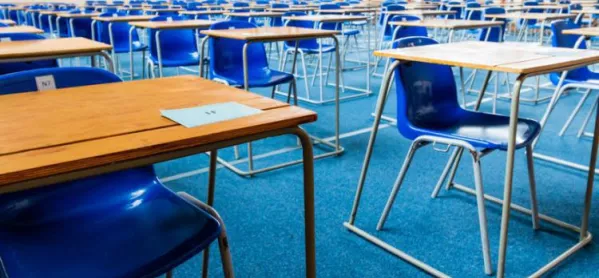- Home
- Less than 0.2 per cent of GCSE pupils might get ‘straight 9s’
Less than 0.2 per cent of GCSE pupils might get ‘straight 9s’

Only a small elite group of around 1,000 pupils could get straight nine grades at GCSE this week, according to a report published today.
This would be less than 0.2 per cent of more than half a million teenagers who will receive their exam results on Thursday.
This year, 20 GCSE subjects will be awarded the new 9-1 numerical grades - with a grade 7 broadly equivalent to an A under the old system, and a 4 broadly equivalent to a C.
Prof Alan Smithers, from the Centre for Education and Employment Research at Buckingham University has predicted around 1,000 pupils will get eight top grades at GCSE.
But he said some studies suggest it could be as a low as 200 pupils.
English and maths GCSE were the first qualifications to move to numerical grades last year.
Prof Smithers said a higher percentage of English and maths entries gained the two new top grades - 8s and 9s in 2017 - than the proportion of A*s awarded for the two subjects in 2016 under the old system.
He said this pattern could continue this summer across more subjects.
But he added that some may feel disappointed with grade 8s as it "does not feel as grand as the old A*.
“Parents, pupils and schools have increasingly tended to see straight top grades as the acme of success in GCSE. It looks as though many are going to be disappointed this year,” he said.
Headteachers have voiced concern about the impact that the reformed GCSEs and new grading system will have on the mental health of pupils.
Geoff Barton, general secretary of the Association of School and College Leaders, said: "We are concerned that the new grading system for GCSEs ratchets up the pressure on young people another notch.
"It was already very hard to achieve the top grade of A* under the old system, and it is even harder to achieve the top grade of a 9 under the new system.
"Young people striving for those top grades may therefore feel disappointed if they do not achieve them, even though they have done exceptionally well in the grades they do achieve."
Teenagers should be aware that the "bar has deliberately been set at a higher level" under the new system, and they should "take great pride in their results", he said.
Mr Barton added: "The new grading structure is another aspect of a very significant set of reforms to GCSEs which has put young people under a great deal of additional pressure.
"The new exams are harder, contain more content, and involve sitting more papers.
"We are worried about the impact on the mental health and wellbeing of young people caused by these reforms and it is our view that such a substantial set of changes as this should have been introduced in a more managed and considered manner.
"It is to the credit of schools that they have responded to this situation by providing their students with extensive pastoral support in order to alleviate stress and anxiety despite severe funding pressures."
There have been warnings that employers will view the 9-1 grades as "gibberish" and many parents are confused about what they mean.
An Ofqual spokesman said: "Fewer grade 9s will be awarded in each subject than A*", adding that grades 9s are intended to reward "exceptional performance".
Mary Bousted, joint general secretary of the National Education Union, said: "This year, like last, it has been virtually impossible for teachers to predict their students' results because of a lack of certainty in the new 9-1 grade boundaries.
"We know that students who could have expected to receive an A* in 'legacy' GCSEs will be disappointed if they receive an 8 rather than the top grade of 9.
"This sense of under achievement could lead to them deciding that they aren't good enough in those subjects to continue them to A level."
A Department for Education spokesman said: "Our new gold-standard GCSEs don't just raise academic standards but the new grade 9 provides stretch at the top end of the ability range to recognise and reward truly exceptional performance."
Prof Smithers said his analysis of last year's GCSE results for 16-year-olds in England only showed that the changes have created "more room at the top".
Fewer English and maths entries were awarded a grade 9 than gained an A* in 2016, he said – three per cent against 5.5 per cent.
But a further six per cent of entries got a grade 8.
This means that overall, nine per cent of entries gained a grade 8 or 9, against 5.5% awarded A* in these subjects in 2016.
Keep reading for just £1 per month
You've reached your limit of free articles this month. Subscribe for £1 per month for three months and get:
- Unlimited access to all Tes magazine content
- Exclusive subscriber-only stories
- Award-winning email newsletters



